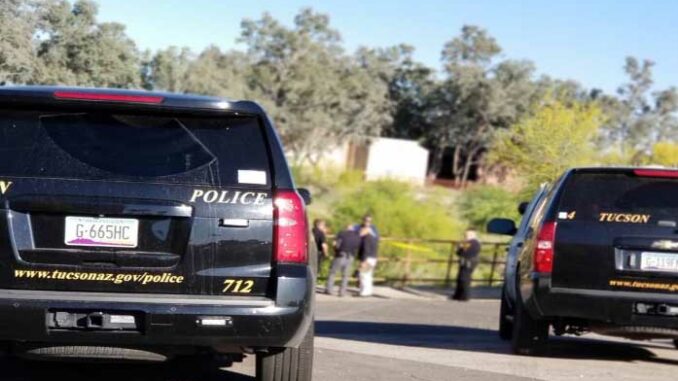
An attempt by the Tucson Police Officers Association (TPOA) and two other city employee unions to block Tucson’s new ordinance mandating COVID-19 vaccination as a condition of employment was rejected by a Pima County judge last week.
TPOA, Tucson Firefighters Association, and Communications Workers of America did not meet their burden to justify a temporary restraining order needed to stop the city’s ordinance, according to an Aug. 19 ruling by Judge Richard Gordon of the Pima County Superior Court. The ordinance allows city officials to suspend employees without pay for up to five days if they fail to provide proof of receiving at least one dose of a COVID-19 vaccine by Aug. 24.
The three public safety employee associations argued the mandate approved by the council on Aug. 13 was implemented without “first bargaining in good faith over the change in working conditions” and that city officials failed to engage in a “meet and confer” process.
Roughly 4,500 people work for the city; about 750 are represented by TPOA while another 300 employees work for TPD in other positions. City employees who fail to provide the required documentation would face weekly COVID-19 testing, prohibitions on work-related travel, and even more restrictive face-covering requirements.
But the ordinance also allows city officials to change the work assignments of unvaccinated employees, suspend the employees without pay, and even terminate their employment for continued violations.
The lawsuit against Mayor Regina Romero, City Manager Mike Ortega, and the six council members did not come as a surprise to city officials. Earlier this month, Ortega ignored the associations’ requests to be involved in developing a vaccination policy.
Ortega also advised the council before the vote that as an employer, the city “may lawfully compel its employees to get vaccinated against COVID-19, and/or to get regular testing to determine any COVID-19 infection, subject to legally required exemptions and/or accommodations.”
The associations then went to court, asking Gordon for a temporary restraining order to block the new ordinance while a more indepth legal challenge took place. On Aug. 10, Gordon heard testimony from TPOA President Don Jorgenson, TFFA President Josh Campbell, and CWA President Linda Hatfield, who represents most of the 911 dispatch center employees. The only witness called by the city was Ana Urquijo, an interim assistant city manager.
After the hearing, Gordon denied the request for a TRO, ruling the associations “have not met their burden.” The associations have limited options for appealing Gordon’s denial of the TRO, but they can still pursue having the ordinance overturned by the court in the future.
The prospect of suspensions -even termination- possibly starting this week comes just months after Tucson Police Chief Chris Magnus announced 20 “critical changes” to department operations in order to address systemic staffing shortages.
Magnus has not commented on how TPD would maintain law and order -and officer safety- if several employees are placed on leave -or fired- over the vaccine mandate. Nor has he publicly commented on the lawsuit, but Magnus’ nomination by President Joe Biden to head the U.S. Customs & Border Protection (CBP) likely means he will not go against Biden’s support of workplace vaccinations.
But one person who has taken issue with the new Tucson ordinance is Arizona Attorney General Mark Brnovich, who noted in an unrelated legal opinion Friday that as of Sept. 29, a new state law takes effect prohibiting cities and towns from mandating COVID-19 vaccines of employees.
And until then, says Brnovich, federal and state law requires employers who mandate vaccinations to provide “reasonable accommodations” to employees who cannot obtain the vaccine due to a disability or a sincerely-held religious belief.
“Any employer inquiry into a disability or sincerely-held religious belief must genuinely serve the employer’s asse1ied business necessity and the request must be no broader and no more intrusive than necessary,” Brnovich wrote.
